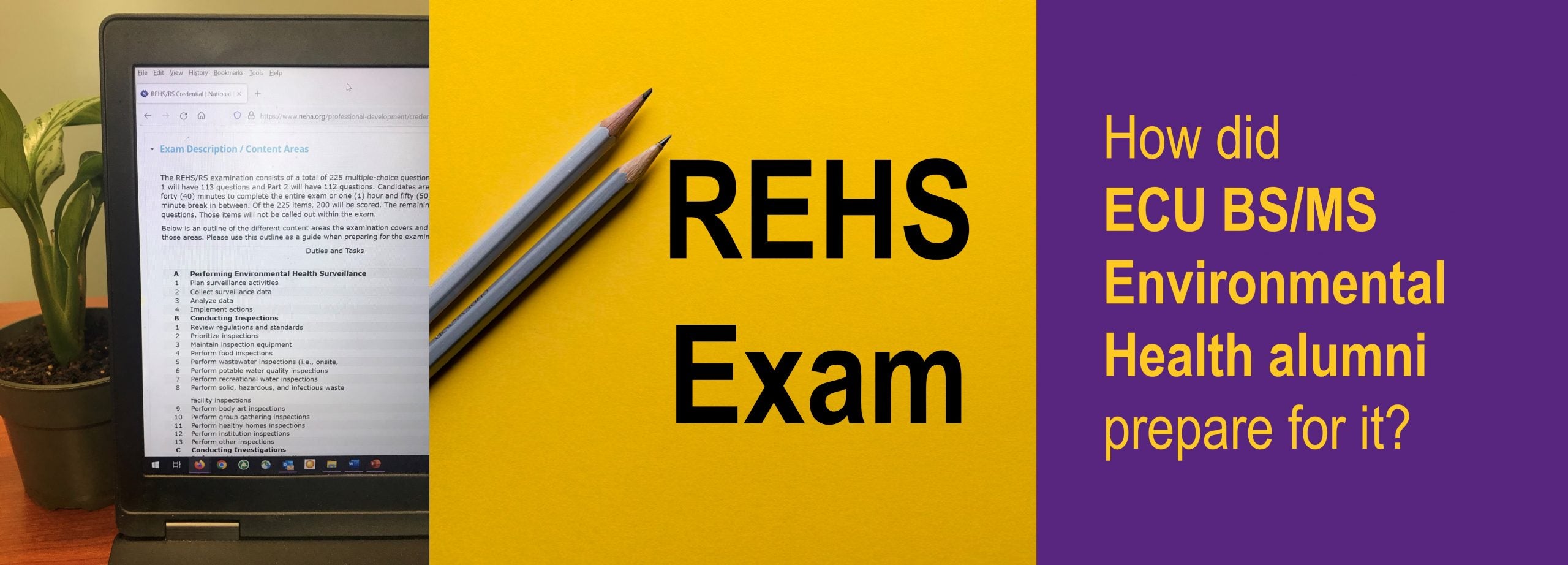Written by: Dr. Jo Anne G. Balanay, Professor, ECU Environmental Health Sciences (EHS) Program
An environmental health professional with an REHS (Registered Environmental Health Professional) credential demonstrates competency in a broad range of environmental health issues and the possession of the skill set to ensure clean air, safe food and potable water as basic community necessities are met and to manage other critical functions (e.g., emergency response, vector control, sewage sanitation, hazardous material handling). The REHS credential is an indicator of excellence that recognizes those who are equipped to handle the wide breadth of environmental health issues, and is a verification that a professional has achieved a baseline level of competency in environmental health (NEHA, n.d.).
So, how do you obtain this credential? By taking and passing the REHS exam that is given by the National Environmental Health Association (NEHA).

How did the alumni of the ECU BS and MS Environmental Health programs prepare for the REHS exam?
We recently solicited feedback from a few of our BS Environmental Health (BSEH) and MS Environmental Health (MSEH) program graduates who currently have REHS credentials or are in the process of completing the exam. Some of the exam resources and courses that they and/or their colleagues found useful are the following:
- NEHA RS/REHS Exam Flashcards / Quizlet: https://quizlet.com/276153166/neha-rsrehs-exam-flash-cards/
- REHS/RS Study References: https://www.neha.org/professional-development/credentials/rehsrs-credential/rehsrs-study-references
- Registered Sanitarian REHS/RS Examination Review Course Workbook: https://registeredsanitarian.com/buy-workbook
- South Central Public Health Partnership courses: https://lms.southcentralpartnership.org/
- CDC Environmental Public Health Online Courses (EPHOC): https://www.cdc.gov/nceh/ehs/elearn/ephoc.htm
- REHS Exam Description / Content Areas: https://www.neha.org/professional-development/credentials/rehs-rs

What did our EH alumni do to prepare for the REHS exam?
Here are their insightful responses, which are related to how much time they spent in reviewing exam materials and what resources helped them:
- “I spent one day a week going through the material in the months leading up to the exam and I spent the entire week before my exam going through the material.”
- “I used a combination of working experience (Health Dept.), presentations from my undergrad courses, and study guides provided from my employer.”
- “I also attended General, Food, and On-Site CIT prior to taking the exam, which I think was a big help.”
- “For the essay and interview, I studied foodborne illness causing organisms from FDA resources in order to take the “food question” (they let you choose between food and onsite when you sign up). For the interview, I researched demographics of my county and spoke with my supervisor to ask what types of questions they typically ask in an interview for my position.”
- “I also reviewed the NEHA breakdown of questions and did independent study on areas I had less knowledge on. I felt overall, I was prepared for a large majority of the questions from the courses I took as an EHS major at ECU. The hardest part is to remember this is a general knowledge-based exam and covers all areas. Knowing one area, such as foods, extremely well is not enough to pass this exam.”

What advice do you have for those planning to take the REHS exam?
Who else will give the best advice on the REHS exam? Those who already took them, of course.
“Start studying for the exam early on since it covers such a broad range of environmental health topics. Try to take it towards the end of coursework or soon after completing your degree while most of the material is still fresh. I would suggest obtaining study material to assist due to the nature of topics covered on the exam.”
Jordan Jernigan, MSEH, REHS
Job title: Total Quality Manager
Employer: Darden Restaurants
REHS exam taken: 2016
“Expose yourself to as much information on the topics as you can. It is okay if you don’t remember everything, but having the knowledge, even if it is brief will help when faced with the wide range of questions on the test. Not all of the questions count, some are used as trial questions for future versions of the exam. If getting NCREHS there is also an essay and interview portion with the NCREHS board. The essay is based on how we would perform certain tasks in the field as either an REHS in the food sector or the on-site waste water program. If you are not currently in the field, it would be good to interview someone in the field about a scenario.”
Lauren Plis Harden, BSEH, REHS
Job Title: Environmental Services Team Manager (Registered Environmental Health Specialist)
Employer: Wake County Environmental Services Department, Raleigh, NC
REHS exam taken: 2018
“I recommend about 2-3 months of studying (1-2 hours per day). Focus on the material that you’re not as familiar with first. I was highly invested in industrial hygiene and on-site while at ECU, so I spent less time reviewing that material and more time focusing on food/lodging, vectors, and EH Law material.”
Jeremy Davis, BSEH, REHS
Job title: Environmental Health Manager
Employer: Wake County Environmental Services Department, Raleigh, NC
REHS exam taken: 2018
“I studied only 5 hours the night before and quickly looked over some items the night before the test. The only reason this worked is I had many EH classes that covered all the topics in the book so much of it was still fresh in my mind from college. I graduated the year before. For those with not as much diversity in their EH classes or exposure to all the topics, I would recommend a lot more studying in-depth. Study more than I did. Have good relating information skills. Know a bit about all topics in EH such as air pollution, storm water, wastewater, industrial health, food safety, common diseases/sickness in all areas, etc.”
Brittany Case, BSEH, REHS
Job title: Registered Environmental Health Specialist
Employer: Buncombe County Environmental Health Department, NC
REHS exam taken: 2018
“My advice would be to study and prep for the multiple-choice part of the exam over a long period, not trying to cram everything in during the last week prior to taking the exam. It is a marathon exam that took several hours, so treating it like any other long exam (SAT, GRE, etc.) would be a good approach… I dressed in a full suit for the interview portion of the exam and treated the interview as if I was interviewing for a job. It was the easiest part of the exam, but I wanted to demonstrate to the REHS board that I was serious about the interview. I think dressing professionally only helped the impression I make on the REHS board.”
Joshua Volkan, MSEH, REHS
Job title: Environmental Health Manager – Food Sanitation
Employer: Wake County Environmental Services Department, Raleigh, NC
REHS exam taken: 2018
“Find your weak areas for the exam and review information for those areas first, then focus on your more confident study areas. Remember that while this exam covers a vast realm of knowledge it is not in depth in one area, don’t get bogged down by trying to know every detail of one area. Don’t forget this is a national exam. The rules specific to NC regulation is not being tested on. As a note, the essay and interview portion of the NC REHS exam is separate from the NEHA exam.”
Christa Sanderford, MSEH, REHS
Job title: Environmental Specialist
Employer: Shellfish Sanitation & Recreational Water Quality, Division of Marine Fisheries, NC Department of Environmental Quality
REHS exam taken: 2018
“As long as your workplace allows, study at the office. You do not want to burn yourself out by working all day and then going home and studying for hours. Block out time in your schedule that is for studying for the REHS exam and stick to those times you have set aside. Do not wait till the last minute, there are several sections on the exam that focus on topics outside of the scope of a North Carolina-based REHS. This material may be completely novel to you. My advice to focus on the areas of the exam that are your weakest before reviewing the stuff you already know.”
Heidi Knecht, MSEH, REHS
Job Title: Environmental Health Program Specialist
Employer: Craven County Environmental Health Department, New Bern, North Carolina
REHS exam taken: 2021
”Don’t spend too much time studying any one area. The exam is very broad and encompasses all aspects of environmental health.”
Danielle Dillane, MSEH, REHS
Job title: Environmental Health Specialist
Employer: Mecklenburg County Health Department, NC
REHS exam taken: 2021
“Take a half day or full day each week to designate for studying at least the few months before the exam! This has helped me to focus chapter-by-chapter, section-by-section of the workbook. Also, print copies of the practice exams in the book to take over and over!”
Jordan Mazzara, MSEH
Job title: REHS Intern – General Inspections (Food, Lodging, Institutions, Childcare, & Tattoo)
Employer: Durham County Health Department, NC
REHS exam taken: 2022 (interview/essay only for now)

As an endnote, our BSEH alum, Jeremy Davis expressed the positive influence of graduating from our EH program on passing the REHS exam. He said, “The exam does cover all aspects of environmental health, but the courses provided at ECU definitely played a major part in me passing the exam. If students are able to take it shortly after they graduate, it will be very beneficial. There was so much information provided over the course of my 4 years in that program, that some of the answers felt like common knowledge. I appreciate all the guidance that the EH professors provided during my time there and wish you all the best moving forward.”
We, in the ECU EHS program, are so proud of our graduates for all the things they do to protect public health as environmental health professionals and practitioners. We hope that they continue to do great things in the region and beyond, even if they sometimes go unrecognized. Go Pirates!
Reference:
National Environmental Health Association (NEHA)(n.d.). REHS/RS Credential. https://www.neha.org/professional-development/credentials/rehsrs-credential




